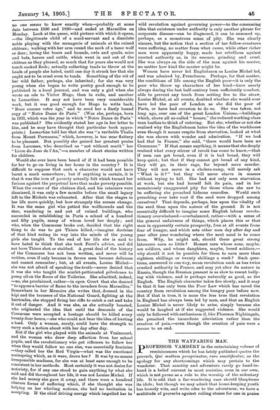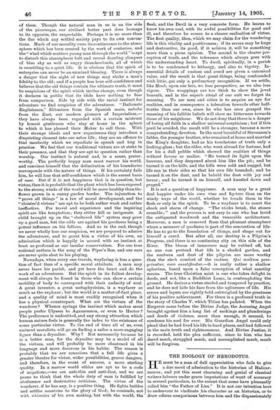P ROFESSOR VAMBERY in the entertaining volume of reminiscences which he
has lately published quotes the proverb, Qui multum peregrinatur, raro sanctifteatur, as the apology for any shortcomings which may pertain to the wanderer. That sanctity and adventure rarely go hand-in- hand is a belief current in most societies, even in our own, which is not prone as a rule to the worship of the sedentary life. It is odd that a far-wandering race should blaspheme its idols; but though we may admit that home-keeping youth has homely wits, and write odes to the adventurer, we have a multitude of proverbs against rolling stones for one in praise of them. Though the natural man in us is on the side of the picaresque, our civilised better part does homage to its opposite, the respectable. Perhaps it is no more than the due which any settled society pays to its own conven- tions. Much of our morality owes its continuance to the atmo- sphere which has been created by the work of centuries, and the " wind which scatters young men through the world " is apt to disturb this atmospheric belt and reveal dazzling glimpses of blue sky as well as angry thunderclouds, all of which is unsettling to a quiet life. It is obvious that the spirit of enterprise can never be an unmixed blessing. There is always a danger that the sight of new things may shake a man's fidelity to the old; and if a people has true self-confidence and believes that the old things contain the ultimate truth, it must be suspicious of the spirit which invites change, even though it declares in public that its idols have nothing to fear from comparison. Side by side with the racial instinct for adventure we find suspicion of the adventurer. " Italianate Englishmen," filibusters from the Spanish main, nabobs from the East, our modern pioneers of Imperialism,— they have always been regarded with a certain mistrust by honest gentlemen who stay at home in the sphere to which it has pleased their Maker to call them. With their strange ideals and new experiences they introduce a disquieting element into our sober life ; they are an offence to that insularity which we repudiate in speech and hug in practice. We feel that our traditional virtues are at stake in their presence, and that they are apt to question rather than worship. Our instinct is natural and, in a sense, praise. worthy. The perfectly happy man must narrow his world, and convince himself that the delimitation of his boundaries corresponds with the nature of things. If his certainty fails him, he will lose that self-confidence which is the surest basis of ease. But if it is not happiness that is in question, but virtue, then it is probable that the plant which has been exposed to the strong winds of the world will be more healthy than the flower grown in a sunny garden border. The injunction to " prove all things " is a law of moral development, and the " cloister'd virtues" are apt to be both rather weak and rather ineffective. For travel and experience and the inquiring spirit are like temptation ; they either kill or invigorate. A child brought up on the " sheltered life " system may grow up a good man, but the odds are against his goodness being a potent influence on his fellows. And so in the end, though we never wholly lose our suspicion, we are prepared to admire the adventurer, and to grant him a virtue of his own, an admiration which is happily in accord with an instinct at least as profound as our insular conservatism. For our true national anthem is the song of the Piper's Son, and our ears are never quite shut to his playing.
Nowadays, when every one travels, wayfaring is less a ques- tion of fact than of a specific moral attribute. A man may never leave his parish, and yet have the heart and do the work of an adventurer. But the spirit in its fullest develop- ment will always be found in those who can show a certain mobility of body to correspond with their audacity of soul. A great inventor, a great metaphysician, is a wayfarer as much as the explorer; but the world is a matter-of-fact place, and a quality of mind is most readily recognised when it has a physical counterpart. What are the virtues of the wanderer? Whence springs the instinct which makes most people prefer Ulysses to Agamemnon, or even to Hector ? The preference is undoubted, and any strong attraction which human nature feels is generally the index to the existence of some particular virtue. To the end of time all of us, even eminent moralists, will go on finding a sailor a more engaging figure than a drysalter. Why ? Not necessarily because he is a better man, for the drysalter may be a model of all the virtues, and will probably be more chastened in his language and more decorous in his habits. The reason is probably that we are conscious that a full life gives a greater theatre for virtue, wider possibilities, graver dangers, and therefore, in the event of success, a more sterling quality. In a narrow world ethics are apt to be a code of negations,—we are anti-this and anti-that, and we are prone to think that the whole duty of man is fulfilled by abstinence and destructive criticism. The virtue of the wanderer, if he has any, is a positive thing. He fights battles and settles countries to the glory of God; he contends, not with whimsies of his own making, but with the world, the
flesh, and the Devil in a very concrete form. He learns to know his own soul, with its awful possibilities for good and ill, and therefore he comes to a clearer realisation of virtue. The first quality, then, which we may claim for the wandering life is this vitality and positiveness ; if its errors may be huge and destructive, its good, if it achieve it, will be something more than a pious opinion. The second is the clearer per- ception of truth, and the tolerance which always goes with the understanding heart. To dwell, spiritually, in a parish is to be condemned to lethargy, and also to bigotry. In- essential details of custom and creed are given a canonical value, and the result is that great things, being confounded with little, get only a perfunctory recognition. If we settle, like Moab, upon our lees, we lose perspective, as we also lose vigour. The wrappings are too thick to show the jewel beneath, and in the superb ritual of our cult we forget its meaning. To see men and cities is to acquire an eye for realities, and in consequence a toleration towards other half- truths than our own, since he who has once grasped the meaning of his fallible beliefs will show no bitterness towards those of hie neighbour. We do not deny that there is a danger of losing all faith in a shallow universal scepticism ; but if this peril be avoided, the result will be a stronger, because a more comprehending, devotion. In the most beautiful of Stevenson's fables, the younger brother, who remained at home and married the King's daughter, had as his touchstone of truth only a looking-glass ; but the elder, who went abroad for fortune, had for his a dull pebble which showed the realities of things without favour or malice. " He turned its light upon the heavens, and they deepened about him like the pit; and he turned it on the hills, and the bills were cold and rugged, but life ran in their sides so that his own life bounded ; and he turned it on the dust, and he beheld the dust with joy and terror ; and he turned it on himself, and kneeled down and prayed?'
It is not a question of happiness. A man may be a great deal happier under his own vine and fig-tree than on the windy ways of the world, whether he treads them in the flesh or only in the spirit. To be a wayfarer is to court the shock and storm of change. "The sticks break, the stones crumble ; " and the process is not easy to one who has loved the antiquated woodwork and the venerable architecture. Moreover, a man is removed from that pleasant atmosphere where a measure of goodness is part of the convention of life. He has to go to the foundation of things, and shape out for himself a creed. But after all, our destiny is a Pilgrim's Progress, and there is no continuing city on this side of the River. The bloom of innocence may be rubbed off, but no one can pretend that life is a shaded garden, and the sunburn and dust of the pilgrim are more worthy than the sleek comfort of the recluse. Qui multum pere- grinatur, raro sanctificatur,—it is really rather a shallow aphorism, based upon a false conception of what sanctity means. The true Christian saint is one who takes delight in deeds, and not, like a Buddhist Lama, in contemplating the ground. He desires a virtue steeled and tempered by practice, and he does not hide his face from the uglinesses of life. His errors and lapses are rightly held outweighed by the greatness of his positive achievement. For there is a profound truth in the story of Charles V. which Titian has painted. When the Emperor came before the Divine Judge, the Accusing Angel brought against him a long list of sackings and plunderings and deeds of violence, more than enough, it seemed, to condemn his soul for ever. His Guardian Angel could only plead that he had lived his life in bard places, and had followed in the main truth and righteousness. And Divine Justice, it is recorded, held the plea sufficient, since to him who has dared much, struggled much, and accomplished much, much will be forgiven.







































 Previous page
Previous page